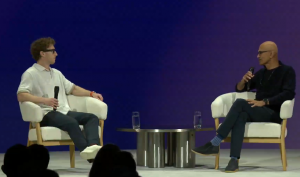RIM’s Rebound Shares App Profits with Carriers
![]() BlackBerry maker Research in Motion may have been undermined by Apple’s iPhone and phones using Google’s Android software, leaving RIM with little but a legacy for market share. Such competition has become the foundation of its forced recovery, brought about by the exceptional success of its competitors. According to recent reports, RIM shares are down primarily because investors believe that the company’s products are losing market share. But, the situation in the market today could help RIM to manage the competition.
BlackBerry maker Research in Motion may have been undermined by Apple’s iPhone and phones using Google’s Android software, leaving RIM with little but a legacy for market share. Such competition has become the foundation of its forced recovery, brought about by the exceptional success of its competitors. According to recent reports, RIM shares are down primarily because investors believe that the company’s products are losing market share. But, the situation in the market today could help RIM to manage the competition.
According to analysts, many carriers are starting to feel threatened by the growing prominence of Apple and Google. They are concerned about there being just two companies controlling a major part of their businesses. Many want a revitalized RIM to serve as a counterbalance, to introduce some real competition back into the market.
“The carriers are looking for guard dogs to keep Apple down and keep Google down,” said John Strand, a telecommunications consultant in Copenhagen. “BlackBerry has had very good relationships with carriers.”
“RIM continues to be a very important strategic partner,” said Marni Walden, the chief marketing officer at Verizon Wireless. “We have found RIM to be meaningful in the consumer space and critical in specific enterprise segments.”
While the carriers do not openly talk about the threat of Apple and Google, according to analysts, the two companies have fostered a system that could make carriers slow-growing utilities, selling little more than generic network access. The revenue from apps, which provide entertainment, news and other services, do not flow to the carriers. With the said threat, RIM has repeatedly told carriers that, unlike Apple, it believes that they deserve a portion of revenues from its apps store and as well as future services.
RIM, is not the only company that hopes to become the carriers’ new best friend. Nokia, the wireless industry’s other humbled giant, is also taking aim at the North American market with a new series of phones using Microsoft’s Windows Phone operating system.
As Microsoft struggles to regain its footing in the new wireless marketplace, it appears to have a timing advantage over RIM. It is said that the North American carriers would most likely receive early versions of the Nokia-Microsoft phones for testing and evaluation within six to eight weeks. On the other hand, RIM may not provide any specific timelines for its new phones–even its test versions appear to be months away. Because of this, analysts say RIM should do something to address the situation, for they cannot afford a mistake at this time.
A message from John Furrier, co-founder of SiliconANGLE:
Your vote of support is important to us and it helps us keep the content FREE.
One click below supports our mission to provide free, deep, and relevant content.
Join our community on YouTube
Join the community that includes more than 15,000 #CubeAlumni experts, including Amazon.com CEO Andy Jassy, Dell Technologies founder and CEO Michael Dell, Intel CEO Pat Gelsinger, and many more luminaries and experts.
THANK YOU













